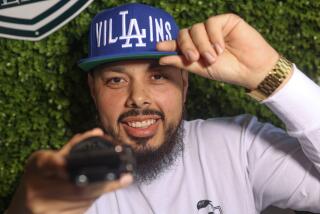David Warsaw’s Novelties Put Him in Major League
- Share via
David Warsaw’s dream as a teen-ager in the 1920s was to play shortstop for his hometown team, the Chicago Cubs. He was good, but he was the last to recognize that he just didn’t have enough talent for professional baseball.
If he couldn’t play on the field, he decided, he would move to the stands where he could blend his passion for sports with his flair for business.
He fashioned ashtrays to look like Wrigley Field, put a Cubs logo on them and got approval from the the team’s owners, the Wrigley chewing gum family, to sell them in the stands during the summer of 1928.
He was only 16 when he founded Sports Specialties, now based in Irvine.
His efforts launched him on a career that found him hobnobbing with sports legends--coaches and owners such as the Wrigleys, George Halas of the Chicago Bears and Walter O’Malley of the Los Angeles Dodgers--as he promoted the new sports merchandising industry.
“Dave was sort of the granddaddy of it all,” said Pete Rozelle, the National Football League commissioner. Warsaw, now 76, sold Los Angeles Rams souvenirs--like spring-necked bobblehead dolls--out of the team’s novelty shop in Beverly Hills while Rozelle was a Rams executive in the late 1950s.
Today, Sports Specialties, minus its sprawling novelties, is the largest distributor of higher-priced baseball caps. Its Pro brand caps adorn the heads of thousands of professional and collegiate athletes as well as millions of Americans.
The NFL prefers to call them coach caps, which is all right with Warsaw and his sons, James and Robert. After all, Sports Specialties is one of only two firms licensed by the NFL to sell Super Bowl caps at retail outlets and at Sunday’s 22nd edition of the annual championship game, which will be played in San Diego.
Including sales during the playoffs, Sports Specialties hopes to put about 500,000 Super Bowl caps on the heads of football fans--at prices of up to $20 for an all-wool cap--by the time the game between the Denver Broncos and the Washington Redskins is over on Sunday, said James H. Warsaw, 40, who has taken over his father’s role as company president.
The company also holds non-exclusive licenses to sell caps embroidered with team logos from Major League Baseball, the National Basketball Assn., the National Collegiate Athletic Assn., the National Hockey League and the Major Indoor Soccer League. And it holds the exclusive rights to market hats for the U.S. Baseball Federation, which puts together teams for the Olympics and the Pan American games.
Goal of Selling 10 Million
Sports Specialties is embarking on an aggressive expansion with plans to sell 10 million caps this year, James Warsaw said. The privately owned company would not reveal financial information. But based on retail prices, sports fans would spend some $130 million this year if the company’s goal is met. The company won’t say how many caps it sold last year, but based on information previously disclosed, Sports Specialties sold 4.5 million hats in 1985 and has been selling more since.
The company typically prices its all-wool caps at $17 each, its corduroy at $13 each and its cotton twill at $11 each. Warsaw said each style accounts for nearly a third of the company’s total sales, while an $8 polyester mesh cap makes up less than 5% of sales. Those prices are at least $2 or $3 higher than its closest competitor.
If the company meets its goal, it will likely expand beyond sales of caps sometime next year. The logical next step, Warsaw acknowledged, would be marketing Pro brand sports apparel. But he declined to reveal further details about the company’s long-range plans.
The Warsaw family sold Sports Specialties 15 months ago to MacGregor Sporting Goods for $10.4 million cash and $6.8 million in stock. But after an acrimonious year with MacGregor management that included lawsuits against each other, the Warsaws helped engineer the sale of Sports Specialties in October to the Oppenheimer-Palmieri Fund, a New York investment company, for $19 million.
Expansion Planned
They not only regained operating control of the company, they also regained some of their stock. Though they will not reveal their new stake, they have the right to name three of the company’s seven directors. Those three are David Warsaw and his sons.
As chairman, executive vice president and chief operating officer, Robert A. Warsaw, 39, coordinates the manufacturing of the Pro caps at plants in Winslow, Ariz., as well as South Korea and Costa Rico. He also is planning to open a new plant in Sri Lanka in September.
The sports world has enabled the Warsaws to continue living second and third childhoods, and their exuberance can be contagious, said some of those who worked with them.
“I’m now 76, but I feel like I’m 23 because I associated with youngsters all my life,” the irrepressible patriarch said. “That’s why I love this business.”
Michael Gaines, who worked with the Warsaws when he was at NFL Properties, the league’s merchandising arm, said they are a close-knit, sports-loving family and are always excited about their work.
“A new cap comes in from Korea,” Gaines said, “and they begin looking at all the details, saying, ‘Isn’t this great?’ They take a lot of pride in what they make.”
The Warsaws also work hard at achieving and maintaining an edge, said Robert Carey, head of NFL Properties.
AJD Cap Corp. in Richmond, Va., for instance, is acknowledged to be the nation’s largest cap maker and one of Sports Specialties’ few competitors at the high-priced end. AJD convinced the NFL that traditional baseball caps would be popular with football coaches, players and fans, Carey said. Sales took off.
“AJD used to be top gun for us,” he said. “But three or four years ago, Sports Specialties took the lead.” The Pro cap now is the volume and revenue leader among the six companies licensed to sell NFL caps, Carey said. He refused to disclose any figures.
James Warsaw said the Pro caps sell well because of the quality of the materials, which Sports Specialties selects, and the workmanship at the plants, which the company does not own. Logos are embroidered on the caps, not pasted on, he said.
Warsaw’s success in marketing Rams products in the late 1950s gave Rozelle the inspiration to form NFL Properties when he became commissioner in 1960.
“One of the items--a very popular item--was a bobble-head doll in a Rams helmet,” Rozelle said. “During that time, clubs were doing very little in marketing their names. I thought the area was profitable. When I became commissioner, I took it in-house, and that’s how NFL Properties was formed.”
Moved to Irvine
NFL Properties licenses 140 different manufacturers and distributors to sell more than 400 products with league and team logos on them. The NFL refuses to disclose any financial figures on its merchandising operation.
About the same time Rozelle got his inspiration, David Warsaw was facing competition from numerous companies that were saturating the market. He said he sought licensing agreements with the Rams and the Los Angeles Dodgers baseball team, as well as the leagues, to protect his own share of the market.
By 1970, though, Warsaw said he and his sons decided that they had become “just another importer” and needed to specialize to become “outstanding in a solid business.” By 1975, they had sold off everything but the caps and moved the company to Irvine.
“I’m tickled pink that we saw specialization coming,” he said. “You find out when you concentrate on one item and on one business that you get known for that item and you get most of the business.”
It was a big change for Warsaw.
Since he founded the company as a division of his family’s Stetson China Co., Warsaw had put sports figures and scenes on ashtrays, mugs, shirts, jackets, banks, key chains and dozens of other memorabilia.
“We made everything you saw in ball parks, except food and jewelry,” he said.
He also invented bobble-head dolls--Lions and Tigers and Bears and other sports mascots emblazoned with team logos. With springs for necks, bobble-heads became popular ornaments for the back windows of cars.
Unpopular Notion
He even started giveaway days at ball parks by passing out bats, balls, gloves or other sports paraphernalia to entice attendance and increase interest in his merchandise.
Warsaw realized that as much as he fancied himself a professional athlete, he was always the entrepreneur. At the age of 13, he became an usher at football games in Soldier Field in Chicago.
“I saw the captive audience, and I said, ‘That’s for me.’ I was not going to pound the pavements selling things,” he recalled. “I had an amazing desire to sell (merchandise) in the stadium. When you have a burning desire, it gets you and you can’t let loose.”
He said he fought with his parents, who wanted him to drop his notions of a sports career or sports business and work in the family’s Stetson China firm. “I became the black sheep of the family,” he said.
The family finally relented. But that was only the start of his battles. It took him about four months in 1928 to get into the Cubs front office to talk with Philip K. Wrigley, son and heir to team owner William Wrigley Jr. The younger Wrigley quickly permitted Warsaw to sell his Cubs ashtrays in Wrigley Field, Warsaw said.
By 1933, at baseball’s first All Star game in Comiskey Park, Warsaw said he was hawking ashtrays and other baseball-emblazoned pottery in the stands. The following year, George Halas, owner of the Chicago Bears football team, allowed Warsaw to put Bears logos on merchandise, and the company finally began to expand.
Sons Joined Business
By the late 1930s, Warsaw had contracts with three factories in Japan to crank out a host of items to go along with the pottery items that Stetson China was making for him. When World War II broke out, he ended dealings with the Japanese plants and opened scaled-down operations in the United States.
After the war, he said, he moved to Beverly Hills and opened a plant in Eagle Rock, and business soon was brisk. In the mid-1950s, his family sold Stetson China, but Warsaw kept Sports Specialties.
In 1967, he signed a deal with a Korean company to make baseball caps. In the early 1980s, Sports Specialties hired firms in Arizona and Costa Rica to make more caps to meet the growing demand.
As his sons graduated from college ready to take over the family business, Warsaw sent each of them to the Far East for two years to learn Asian culture and customs. They also made caps in the Korean factory so they would understand factory needs, James Warsaw said.
In early January, 1985, two days after Sports Specialties celebrated the opening of its 50,000-square-foot warehouse and new headquarters, David Warsaw collapsed on the warehouse floor and stopped breathing. His sons used cardiopulmonary resuscitation to revive their father, according to longtime family friend Michael Gaines. The elder Warsaw had suffered an abdominal aortic aneurysm.
Now semi-retired and living in Palm Springs, a healthy David Warsaw said he keeps active in charity and social work. “I’m going to retire when I’m 99,” he said.
More to Read
Go beyond the scoreboard
Get the latest on L.A.'s teams in the daily Sports Report newsletter.
You may occasionally receive promotional content from the Los Angeles Times.










